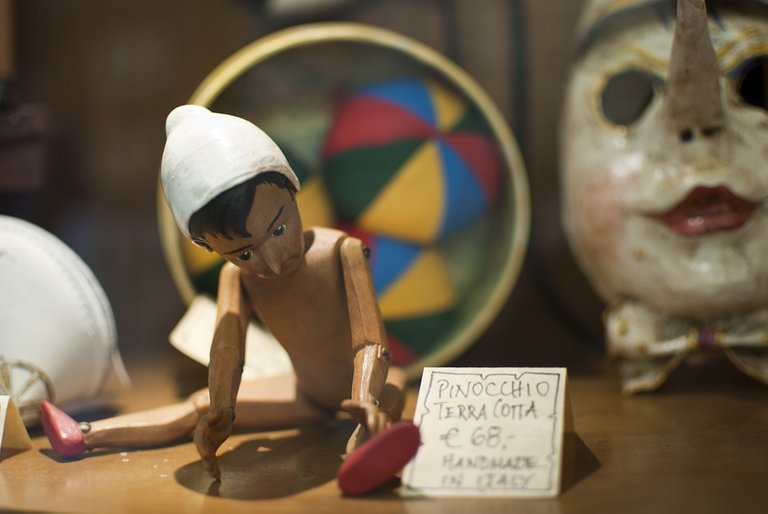The Pinocchio Code
Peter strolled through the courtyard every morning, played with his magnifying glass, observed the vast underworld that stretched out beneath his feet. He saw the ants and beetles, full of life and apparent purpose. He wondered what was really driving these insects, where was the code that defined their behavior.
He was just a boy of ten years old, the only child of his widowed mother, he never knew his father. They say he did know him, but he had no memory of that, he was less than two years old when his father died. At school he was outstanding and at home he was extremely tidy. "Model child", that's what his mother's friends called him.
Something was bothering him that morning, a certain classmate had told him that he, Peter, was not a real boy, that his brain was a computer, that his real brain died when he was a baby. He told him he heard that from his mother, who was Peter's mother's best friend.
That morning, Peter arrived home, went to his mother's study, where he knew there were documents that his mother guarded with suspicion. He had always respected his mother's privacy. Over the years, she had let her guard down, since he was a perfect child, truly incapable of violating a verbal commitment. But at that moment, intrigue overcame his morals.
He found a newspaper from eight years ago that told of the accident where her father died. He discovered that he was with his father in that accident. He found evidence that he was declared "brain dead" and a contract where his mother authorized him to be implanted with a microchip that was going to take control of all the functions of his body. A certain advertisement accompanied that contract: "Emulating Creation, God's Miracle". They said this chip could learn and develop cognitive activities in the same way a human could.
But then he was not human... What was he? How could he see himself? How could he know if he was alive? How could he know if he felt the same as the others? How could he be sure that he really felt anything? He could never again consider himself the same as the others.
This caused him unspeakable conflicts, something he had never felt before. "I'm just a program, a good code, not a real child". That's why he watched these ants more closely now. It tormented him to think that even they were better than he was, that they had a more perfect code, designed by a higher intelligence: God, the ultimate creator.
He lifted the magnifying glass and looked at the ants, he looked at them closely, very closely, he was envious of the miracle they were, of the miracle he could not be. He tilted the lens and looked for the light, orienting his magnifying glass towards the ants, he concentrated the light and burned them all...
El Código Pinocho
Peter paseaba por el patio todas las mañanas, jugaba con su lupa, observaba el inmenso sub-mundo que se extendía bajo sus pies. Veía las hormigas y los escarabajos, llenos de vida y aparente propósito. Se preguntaba qué era lo que realmente impulsaba a estos insectos, dónde estaba el código que definía su conducta.
Él era apenas un niño de diez años, hijo único de su madre viuda, nunca conoció a su padre. Dicen que sí lo conoció, pero él no tenía memoria de ello, tenía menos de dos años cuando su padre murió. En la escuela era sobresaliente y en la casa era extremadamente ordenado. "Niño modelo", así lo llamaban las amigas de su madre.
Algo lo molestaba esa mañana, cierto compañero de clases le había dicho que él, Peter, no era un niño de verdad, que su cerebro era una computadora, que su verdadero cerebro murió cuando él era un bebé. Le dijo que lo escuchó de su madre, quien era la mejor amiga de la madre de Peter.
Esa mañana, Peter llegó a su casa, se dirigió al estudio de su madre, donde sabía había documentos que su madre guardaba con recelo. Él siempre había respetado la privacidad de su madre. Con los años, ya ella había bajado la guardia; él era un niño perfecto, realmente incapaz de violar un compromiso de palabra. Pero en ese momento la intriga pudo más que su moral.
Encontró un periódico de hacía ocho años que hablaba del accidente donde murió su padre. Descubrió que él estuvo con su padre en ese accidente. Encontró evidencia de que le fue declarada "muerte cerebral" y un contrato donde su madre autorizaba a que le implantaran un microchip que iba a tomar el control de todas las funciones del cuerpo. Cierta publicidad acompañaba a ese contrato: "Emulando La Creación, El Milagro de Dios". Decían que aquel chip podía aprender y desarrollar actividades cognoscitivas de la misma forma que lo haría un humano.
Pero entonces no era humano... ¿Qué era? ¿Cómo podía verse a sí mismo? ¿Cómo saber si estaba vivo? ¿Cómo saber si sentía lo mismo que los otros? ¿Cómo podía estar seguro de que en realidad sentía algo? Ya no podría jamás considerarse igual a los demás.
Aquello provocaba en él indecibles conflictos, algo que nunca antes había sentido. "Sólo soy un programa, un código muy bueno, no soy un niño de verdad". Por eso observaba, ahora con mayor detenimiento, a estas hormigas. Le atormentaba pensar que incluso ellas eran mejor que él, que tenían un código más perfecto, diseñado por una inteligencia superior: Dios, el máximo creador.
Levantó la lupa y acercó la vista a las hormigas, las miró de cerca, muy de cerca, sentía envidia por el milagro que ellas eran, por el milagro que él no podía ser. Inclinó la lente y buscó la luz, orientando su lupa hacia las hormigas, concentró la luz y las quemó a todas...
